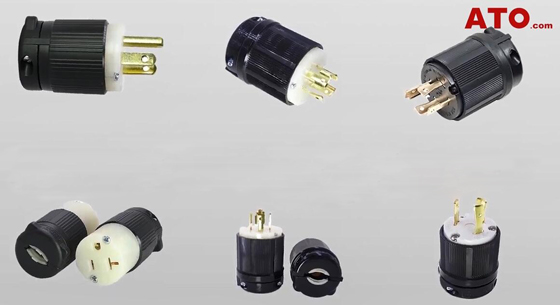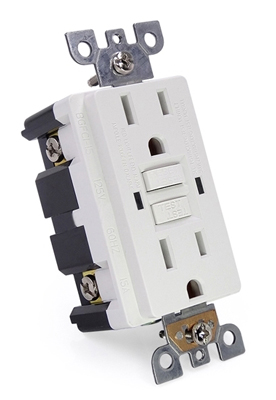How to Choose Locking Plugs?
Electrical outlets are an essential part of any home as well as commercial buildings and industrial areas. Improper configurations of plugs and receptacles could result in serious electrical hazards, such as short circuit, electrocution, electrical fires and so on. Therefore, it’s important to select the right outlets for any space that involves electricity.
There are a variety of factors that should be taken into consideration when choosing and ideal locking plug or connector for any of your needs. You’ll need to consider the right combinations of amperage and voltage for specific appliances and the number of blades as well as different grades of outlets for commercial or residential buildings. Last but not least, there are also special features you can select for your outlets that suit your home and your family’s needs.

Following, we’ll go over each factor to help you choose the best outlet.
Amperage
- Selecting outlets with rated amperage no less than the circuit.
When picking out a new plug or receptacle, ensure that the amperage of the circuit must be the same as or greater than the outlet you’re installing. It is important because incompatible rating and type of connectors won’t have precisely the same prong configuration. - Most households have 15 amp outlets installed in place.
The common plugs are rated for 125V to 600V and 15 amps to 60 amps. Most households have 15 amp outlets installed in places where lower consumption is expected such as bedrooms and living rooms. - 20 amp outlets are often installed in higher-use areas.
In higher-use areas such as kitchens and bathrooms, 20 amp outlets are often installed. - 15 amp locking plugs can be inserted in either 15 or 20 amp outlets.
Keep in mind that 15 amp locking plugs can be used in either 15 amp or 20 amp outlets, but 20 amp receptacles should only be used in 20 amp circuits.
Voltage
- 110-120V plugs are generally used for common household appliances.
- 220-240V plugs are used for heavy duty industrial applications.
- 220-240V round plugs are a common alternative for 110-220V plugs.
There are a variety of voltages commonly used: 110-120V plugs are generally used for common household appliances. 220-240V plug can deliver more electric power and are used for heavy duty industrial applications, generators and water pumps. While 110V and 12V 3 wire grounded plugs are a standard type typically found in the United States, 220-240V round plugs are a common alternative.
Examples of appliances using specialty outlets:

Heavy duty 240V outlets are designed for larger appliances, such as dryers and electric ovens that need more voltage to operate will need heavy duty electrical outlets to function properly. Check your electric cord to make sure whether you need 3-prong or 4-prong varieties.

There are also electrical outlets that come with special features, such as built-in USB outlets. They are extremely convenient for charging cell phones, headphones or other small electronic devices in the kitchen, bedroom, living room or anywhere else you like.
Number of blades
Blades, also call pins, are male locking plug contacts that connect with female locking plug contacts. You can find round or flat blades in a variety of sizes on a plug. The number of pins you need for an outlet often depends on the appliance you’re trying to plug into it. To prevent serious safety hazards from occurring, it’s vital that you pick out a plug or connector with the right amount of blades as well as the correct configuration.
Outlet Grades
"Grade" essentially means levels of quality regarding outlets. There are generally three grades you can choose from.
- Homeowner grade (Last 5-10 years)
Outlets of homeowner grade are the cheapest option on the market. Intended for daily use in residential spaces where devices do not need to be constantly plugged in. typically last about 5-10 years. - Commercial grade (Last up to 100 years)
Commercial grade outlets deliver greater durability that homeowner grade ones. They last up to 100 years. These type of outlets are best placed where devices need to be connected to electricity constantly. - Hospital grade
Hospitable grade outlets are designed for use in medical environments where life-saving medical devices cannot allow accidental disconnection.
GFCI or AFCI outlets
When choosing an outlet, it is important to consider where it will be installed and which outlet will be the safest. In general, there are 2 types of outlets designed to keep you safe. They are GFCI outlets and AFCI outlets.
GFCI (Ground Fault Circuit Interrupters)
Ground fault circuit interrupter or GFCI for short, is a type of outlet with built-in safety device.
- Contain a small circuit breaker.
- Can protect you and your family from electric shock.
They contain a small circuit breaker that trips if a short circuit is detected. Hence they can protect you and your family from electric shock. GFCI outlets are typically installed in moist places like kitchens, bathrooms, outdoor locations, and locations by sinks or water sources.
AFCI (Arc Fault Circuit Interrupters)
- Include a small built-in breaker.
- Protect your home from electrical fires.
- Typically found in bedroom.
AFCI outlets, or arc fault circuit interrupters also include a small built-in breaker that can interrupt power when an electrical arc happens, thus protecting your home from electrical fires. AFCI outlets are typically found in bedrooms.
As you can see, there are several different grades and types of electrical outlets. Each of these has its own unique advantages, and the one that you choose will depend on your existing circuit conditions and future needs.
That being said, installing an electrical outlet at home, while it can be done, is nearly always something that you should hire an expert for. Dealing with wiring can be tricky and delicate, and it requires knowledge of how electrical circuits work.
If you want to know more about how to buy NEMA plug, view the video below.

